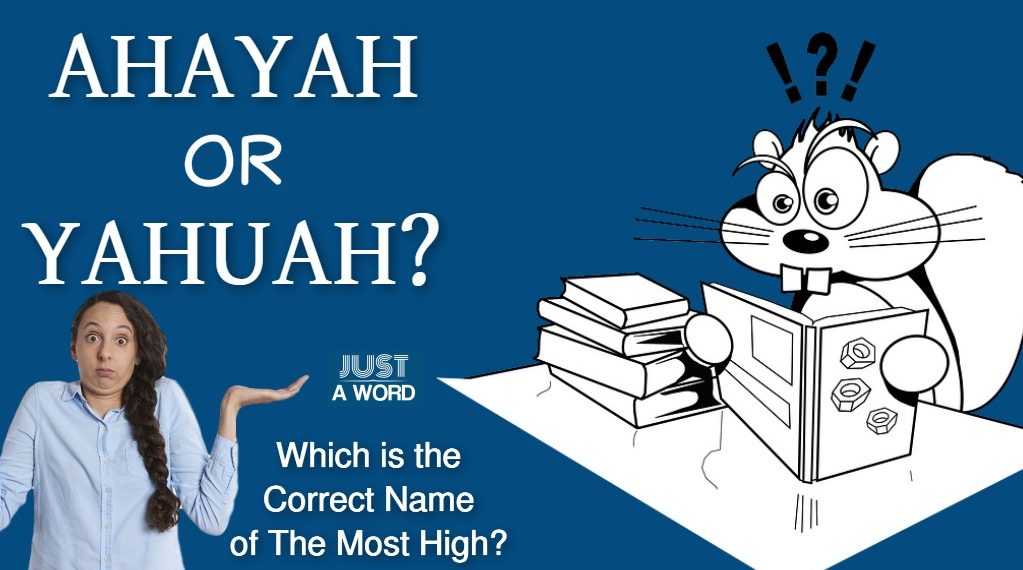PAGE CONTENTS
- 0.1 RelatedPosts
- 0.2 Who are the Edomites today? Where are the descendants of Esau today? Powerful Proof!
- 0.3 Why Do You Say Aluah And Not Elohim?
- 1 AHAYAH or YAHUAH?
- 2 MEANING OF THE WORD “MEMORIAL”
- 3 THE NAME YAHUAH AS A MEMORIAL
- 4 TRADITION OF USING NAMES TO COMMEMORATE EVENTS
- 5 WHAT DOES THE NAME YAHUAH COMMEMORATE?
- 6 YAHUAH THE SAVIOUR
- 7 HIS NAME HIDDEN BY THE GENTILES
- 8 THE MOST HIGH HAS SEVERAL NAMES (YAHUAH TSEVA’OTH)
- 9 NAMES AS MEMORIAL OF COVENANTS
- 10 IS THE NAME YAHUAH STILL VALID AS A MEMORIAL?
- 11 I AM vs HE IS
- 12 CONCLUSION: AHAYAH VS YAHUAH
- 13 Related Podcast
AHAYAH or YAHUAH?
AHAYAH or YAHUAH? Which one is the correct name of the Most High?
There are numerous debates about various topics in the Bible, of course, and today we look at another one of them. This is the discussion over whether or not the name of the Most High is AHAYAH or YAHUAH.
This stems from the Book of Shemoth (Exodus) 3:13-15, when the Most High gave his name to Mosheh to give to the children of Israel. Instead of giving one name, scripture records him giving two names! Which one is right?
Now, let’s begin with the question Mosheh posted to the Most High:
Exo 3:13 And Moses said unto Aluahym, Behold, when I come unto the children of Israel, and shall say unto them, The Aluahym of your fathers hath sent me unto you; and they shall say to me, What is his name? what shall I say unto them?
The Most High then gave him a name to tell them.
Exo 3:14 And Aluahym said unto Moses,I AM THAT I AM (AHAYAH ASHAR AHAYAH): and he said, Thus shalt thou say unto the children of Israel, I AM (AHAYAH) hath sent me unto you.
That name, I AM THAT I AM is written in Hebrew as AHAYAH ASHAR AHAYAH.
AHAYAH means “I AM.”
Now is it a legit name? Yes it is!
However, the Most High did not stop there. He also gave Mosheh another name as a MEMORIAL!
Exo 3:15 And Aluahym said moreover unto Moses, Thus shalt thou say unto the children of Israel, YAHUAH Aluahym of your fathers, the Aluahym of Abraham, the Aluahym of Isaac, and the Aluahym of Jacob, hath sent me unto you: this is my name for ever, and this is my memorial unto all generations.
It is verse 15 that is flat out rejected by those who say AHAYAH is the only name that we should use.
YAHUAH INSERTED?
They even go as far as saying it was added to the scripture by the translators and some say that the Tetragrammaton YHUH from which we get YAHUAH is just another name for Satan, as is God, Jehovah, Yahweh, Yahahwah, and the list goes on.

To them, his name is only AHAYAH and none else. How could there be 2 names? How could the Most High give two names when Mosheh asked for one?
Well, the name YAHUAH was found written in Paleo Hebrew in the Dead Sea Scrolls, which are the oldest dated manuscripts.

If you look in the image above from the Dead Sea Scrolls, you will see the name YAHUAH written in Paleo Hebrew. That is the original language in which it was given.
As you can see, the name is written a little differently from the rest of the passage, which was written in scripted Hebrew. That is why some believe it could be a forgery.
However, it could be that in order to preserve the authenticity of the name, it was preserved in Paleo Hebrew, and not in scripted Hebrew. I said could be because we are here throwing out the possibilities.
Finish this post and when you are done, you will see that we don’t even need the Dead Sea Scrolls to prove the validity of the name YAHUAH.
This is because, fortunately for us, the Most High told us how to find scriptural knowledge (Isaiah 28:9), so that we do not fall backward, be snared and taken in error (Isa 28:13).
Isa 28:9-11 Whom shall he teach knowledge? and whom shall he make to understand doctrine? them that are weaned from the milk, and drawn from the breasts. For precept must be upon precept, precept upon precept; line upon line, line upon line; here a little, and there a little:
For with stammering lips and another tongue will he speak to this people.
Related: How to Properly interpret Scripture (Understanding the Bible, Part 3).
MEANING OF THE WORD “MEMORIAL”
Before we go into precepts though, let us look at the meaning of the word, memorial. By doing so, we shall see that it is this one word “memorial” from Exo 3:15 that makes all the difference!
Transliteration: zêker zeker
Pronunciation: {zay’-ker} zeh’-ker
Definition: From H2142; a {memento} abstractly recollection (rarely if ever); by implication commemoration: – {memorial} {memory} {remembrance} scent.
The word “memorial” means commemoration (of an event), a recollection (of an event), memory (of an incident/event).
So the name YAHUAH given in Exodus 3:15 is a memorial, commemoration, recollection, or memory.
In Exo 3:14 we got AHAYAH as a name, but Yod He Uah Hey, YAHUAH in Exo 3:15 as a memorial.
Now let’s see this come alive through precepts upon precepts, upon precepts, line upon line, upon line, here a little, there a little (Isa 28:9).
THE NAME YAHUAH AS A MEMORIAL
Let’s get some matching precepts to show the validity of the name YAHUAH as a memorial, and that it was not just a worthless, sinister Tetragrammaton (YHUH) that was injected into scripture.
Hos 12:4 — Hos 12:5
Yea, he had power over the angel, and prevailed: he wept, and made supplication unto him: he found him in Bethel, and there he spake with us; Even YAHUAH TSEVA’OTH ; YAHUAH is his memorial.Psalms 135:13
Thy name, O YAHUAH, endureth forever; and thy memorial, O YAHUAH, throughout all generations.
There we see his name being heralded as a memorial! AHAYAH is not his memorial, it is more like a descriptive title of who he is. This name YAHUAH has a different purpose, which is why YAHUAH gave Mosheh two names!
Now let us match those 2 verses above (Hos 12:4-5 and Psalms 135:13) with Exodus 3:15:
Exo 3:15 And Aluahym said moreover unto Moses, Thus shalt thou say unto the children of Israel, YAHUAH Aluahym of your fathers, the Aluahym of Abraham, the Aluahym of Isaac, and the Aluahym of Jacob, hath sent me unto you: this is my name for ever, and this is my memorial unto all generations.
There we have it again: YAHUAH as a memorial name! We see that apart from the name AHAYAH given in Exo 3:14, there was another name given for another purpose. This purpose was for the name to serve as a memorial. Most importantly, it was a memorial forever (unto all generations).
TRADITION OF USING NAMES TO COMMEMORATE EVENTS
Using precepts we find that there is a tradition of using names to commemorate events. Let us look at the process. Moses was given instructions to record an event in a book as a memorial.
Exo 17:14 And YAHUAH said unto Moses, Write this for a memorial in a book, and rehearse it in the ears of Joshua: for I will utterly put out the remembrance of Amalek from under heaven.
Now how did Mosheh commemorate the event? He gave the place a name!
Exo 17:15-16 And Moses built an altar, and called the name of it YAHUAHNISSI: For he said, Because YAHUAH hath sworn that YAHUAH will have war with Amalek from generation to generation.
WHAT DOES THE NAME YAHUAH COMMEMORATE?
Now the name YAHUAH as a memorial, a commemoration, a remembrance? What does it commemorate?
Exo 6:2 — Exo 6:4
And Elohiym spake unto Moses, and said unto him, I am YAHUAH: And I appeared unto Abraham, unto Isaac, and unto Jacob, by the name of El Shaddai, but by my name YAHUAH was I not known to them. And I have also established my covenant with them, to give them the land of Canaan, the land of their pilgrimage, wherein they were strangers.
YAHUAH established his covenant with Abraham, Isaac, and Jacob under the name El Shaddai. They did not know him as YAHUAH.
So remember, the question we are attempting to answer is, what does the name YAHUAH commemorate?
1Sa_10:18 And said unto the children of Israel, Thus saith YAHUAH Aluahym of Israel, I brought up Israel out of Egypt, and delivered you out of the hand of the Egyptians, and out of the hand of all kingdoms, and of them that oppressed you:
The name YAHUAH commemorates the deliverance of the children of Israel out of the land of Egypt. That was why it was given as a memorial to Mosheh before he delivered the children of Israel. That is why it is continuously repeated throughout the Tanakh (old testament).
Exo 20:2 I am YAHUAH (name) thy Aluahym (the Aluahym of Israel), which have brought thee out of the land of Egypt (event/incident that the name commemorates), out of the house of bondage (saved Israel from the bondage of Egypt: YAHUAH is salvation).
Hos_13:4 Yet I am YAHUAH (memorial) thy Aluahym from (that brought you out from) the land of Egypt, and thou shalt know no god but me: for there is no saviour beside me.
Right here, we see what the name YAHUAH commemorates. The deliverance of the children of Israel out of bondage in Egypt.
YAHUAH THE SAVIOUR
The name YAHUAH, therefore, commemorates the Most High as the saviour of Israel.
Egypt was an incident never to be forgotten by the children of Israel. It is to be celebrated by calling the name YAHUAH.
This is because he would make a covenant with Israel, the punishment of which was bondage if they went too far in sin (Deut 28:15-68). So he always referred back to what he did in Egypt.
Exo 20:2 I am YAHUAH thy Aluahym, which have brought thee out of the land of Egypt, out of the house of bondage.
Isa_43:3 For I am YAHUAH thy Aluahym, the Holy One of Israel, thy Saviour: I gave Egypt for thy ransom, Ethiopia and Seba for thee.
However, he has allowed his name to be hidden by the Gentiles. Almost 7000 times, they removed his name from the scriptures and replaced it with “The Lord,” which of course is another name for Ba’al. His title Aluahym/Elohiym was replaced with “God” (god of fortune – See: Who is the God of Fortune).
Now it is important to note that in the time of deliverance of his people, they shall once again know the name YAHUAH.
Isa 52:5-6 Now therefore, what have I here, saith YAHUAH, that my people is taken away for nought? they that rule over them make them to howl, saith YAHUAH; and my name continually every day is blasphemed.
Therefore my people shall know my name: therefore they shall know in that day that I am he that doth speak: behold, it is I.
HIS NAME REVEALED AT THE TIME OF SALVATION
When it is time to deliver his people, they shall know his name, his memorial, that commemorates when he brought the children of Israel out of Egypt. This referring to the end time:
Jer 16:14-15 Therefore, behold, the days come, saith YAHUAH, that it shall no more be said, YAHUAH liveth, that brought up the children of Israel out of the land of Egypt;
But, YAHUAH liveth, that brought up the children of Israel from the land of the north, and from all the lands whither he had driven them: and I will bring them again into their land that I gave unto their fathers.
That is why the name YAHUAH is still valid. It was given as a memorial unto all generations. Indeed. all is not yet fulfilled.
Now when this new Egypt event occurs, what about his name? Go down to verse 21 and we see:
Jer 16:21 Therefore, behold, I will this once cause them to know, I will cause them to know mine hand and my might; and they shall know that my name is YAHUAH.
That is why the name YAHUAH has been shut up until now being revealed in the end time. That is why those saying his name is only AHAYAH are in great error. They are missing something: the name that was given as a memorial of a past event that points to a future event.
THE MOST HIGH HAS SEVERAL NAMES (YAHUAH TSEVA’OTH)
What’s more, here is a little obvious point the AHAYAH hardliners are ignoring. The fact that he told Mosheh that he gave Abraham, Isaac, and Jacob the name El Shaddai, tells us that he goes by multiple names. Indeed, whenever he wants to show his might, he uses the name YAHUAH TSEVA’OTH or YAHUAH of Hosts.
Jer_32:18 Thou shewest lovingkindness unto thousands, and recompensest the iniquity of the fathers into the bosom of their children after them: the Great, the Mighty Aluahym, YAHUAH TSEVA’OTH, is his name,
So why add on the “of hosts?” Let’s see the meaning:
H6635
צְבָאָה צָבָא
tsâbâ’ tsebâ’âh
tsaw-baw’, tseb-aw-aw’
From H6633; a mass of persons (or figurative things), especially regularly organized for war (an army); by implication a campaign, literally or figuratively (specifically hardship, worship): – appointed time, (+) army, (+) battle, company, host, service, soldiers, waiting upon, war (-fare).
Total KJV occurrences: 484
It shows him as mighty and powerful above all, ready to battle for his people.
1Sa_17:45 Then said David to the Philistine, Thou comest to me with a sword, and with a spear, and with a shield: but I come to thee in the name of YAHUAH TSEVA’OTH, the Aluahym of the armies of Israel, whom thou hast defied.
Therefore his names are for different occasions or situations. He does not only have one name!
NAMES AS MEMORIAL OF COVENANTS
If we study the usage of names in the Bible, several names were changed as a result of events as well as to commemorate covenants. This is why the name YAHUAH was given, to commemorate the salvation of Israel out of the land of Egypt (the house of bondage).
THE NAME ABRAHAM AS A MEMORIAL
So let us cite other occasions that names were changed to match covenants and mark significant events.
Gen 17:4 — Gen 17:5
As for me, behold, my covenant is with thee, and thou shalt be a father of many nations. Neither shall thy name any more be called Abram, but thy name shall be Abraham; for a father of many nations have I made thee.
Now Abram’s name was changed to Abraham before he was given the covenant of circumcision. Just as Israel was given the name YAHUAH in Exodus 3:15, before they entered into the covenant at Sinai. After Abraham’s name was changed, then the covenant.
Gen 17:11 And ye shall circumcise the flesh of your foreskin; and it shall be a token of the covenant betwixt me and you.
THE NAME ISRAEL AS A MEMORIAL
In yet another significant event., we see another name change.
Gen 32:27 — Gen 32:28
And he said unto him, What is thy name? And he said, Jacob. And he said, Thy name shall be called no more Jacob, but Israel: for as a prince hast thou power with Elohiym and with men, and hast prevailed.
A NEW NAME FOR THE END TIME DELIVERANCE OF ISRAEL
It does not end there. There will be another name change in the end times, as the set-apart remnant of Israel will be renamed by YAHUAH.
Isa 62:2
And the Gentiles shall see thy righteousness,and all kings thy glory:and thou shalt be called by a new name,which the mouth of YAHUAH shall name.
NEW NAME (MEMORIAL) FOR THE MESSIAH
Even the Messiah is going to have a new name!
Revelation 3:12
Him that overcometh will I make a pillar in the temple of my Elohiym, and he shall go no more out: and I will write upon him the name of my Elohiym, and the name of the city of my Elohiym, which is new Jerusalem, which cometh down out of heaven from my Elohiym: and I will write upon him my new name.
This shows us the importance of the name as a memorial.
Indeed, every “game-changing” incident it seems is blessed with a new name! That is why the name YAHUAH was given in Egypt to the Israelites. It commemorated the “game-changing” deliverance of the Israelites out of bondage. It commemorates the salvation of Israel.
IS THE NAME YAHUAH STILL VALID AS A MEMORIAL?
Now is the name YAHUAH still valid as a memorial today?
Certainly!
Our walk in the end time mirrors that of the children of Israel in Egypt. Indeed, all prophecies are for Israel to be delivered from bondage in the end times. We are still in (spiritual) Egypt and must always remember YAHUAH as a memorial. Why?
The law was a shadow of things to come (Heb 10:1). It mirrored what is happening to us today. What’s more, he promised that his name will be heralded upon the salvation of his people out of end-time spiritual Egypt.
Jer_23:7-8 Therefore, behold, the days come, saith YAHUAH, that they shall no more say, YAHUAH liveth, which brought up the children of Israel out of the land of Egypt;
But, YAHUAH liveth, which brought up and which led the seed of the house of Israel out of the north country, and from all countries whither I had driven them; and they shall dwell in their own land.
So there we see that in the end time, we will still be praising the name of the Most High, his memorial: the name YAHUAH. YAHUAH liveth.
I AM vs HE IS
Now most of those who use the AHAYAH name do not call the Most High AHAYAH ASHAR AHAYAH (I AM THAT I AM). Instead, they call him AHAYAH (only).
In so doing, who are they exalting? We are not saying I AM THAT I AM. Rather we are saying that “I AM.” So are we exalting the Most High?
Doesn’t saying I AM appear to be exalting self as the Most High? If I say “I AM,” am I not appearing to be speaking about myself?
YAHUAH on the other hand, means the “Existing One,” and it comes from the Hebrew root word which means “He Who Was, Who Is and Will be.”
Notice YAHUAH means HE, not I.
Therefore, in calling YAHUAH’S name, we are not speaking in the first person, but rather referring to the Most High.
The following verse shows us that something is missing when we only use the word AHAYAH.
“I am YAHUAH, that is My Name, and My esteem (glory) I do not give to another, nor My praise to idols.” ~Isaiah. 42:8
If instead of YAHUAH in Isaiah 42:8 above, the name should have been “I Am,” then he would be saying:
I Am I Am, that is my name. Now does that sound right?

CONCLUSION: AHAYAH VS YAHUAH
Therefore, AHAYAH vs YAHUAH?
AHAYAH is the name that denotes who he is.
I AM THAT I AM is saying I am self existing, dependent on no one. You cannot make me who you want me to be, or what suits you. I AM THAT I AM independent of you.
YAHUAH, on the other hand, commemorates an event that is ongoing: the deliverance of Israel from bondage. That bondage has not ended and Israel will be finally gathered by the Messiah upon his return. The commemorative name YAHUAH is just as important today, as it was on the deliverance out of the physical land of Egypt.
Therefore, both names, AHAYAH and YAHUAH are relevant, but AHAYAH describes his status, as it were.
YAHUAH on the other hand, is the name that points to the hope of our salvation. It is still relevant in the end times, as this end-time prophecy tells us (this has not yet been fulfilled):
Isa_60:16 Thou shalt also suck the milk of the Gentiles, and shalt suck the breast of kings: and thou shalt know that I YAHUAH am thy Saviour and thy Redeemer, the mighty One of Jacob.
What’s more, those who use AYAHAH only seem to think that there is only one name of the Most High. Certainly not! Here we see El Shaddai being used in a future prophecy:
Rev 21:22 And I saw no temple therein: for El Shaddai (the Lord God Almighty – KJV) and the Lamb are the temple of it.
Here we see him being called another name, even after he gave the name I AM THAT I AM in Exodus 3:14:
Isa_47:4 As for our redeemer, YAHUAH TSEVA’OTH is his name, the Holy One of Israel.
The bottom line? Those who say AHAYAH are not in error. However, we say YAHUAH as a memorial as this name of the Most High that was given as a memorial. This name commemorates him and exalts him as the saviour of Israel. That salvation is still in progress and will be completed upon the return of the Messiah.
All has not yet been fulfilled.
I AM THAT I AM (AHAYAH ASHAR AHAYAH), YAHUAH, El Shaddai, YAHUAH TSEVA’OTH (of Hosts) are all still applicable. However, the one we should be using that was given for our covenant (through belief in the Messiah) is YAHUAH.
In Exo 3:15, he said: “this is my name for ever, and this is my memorial unto all generations.”
Right there we have the simple instructions. YAHUAH is the name we should be using. No harm in using the others as they exalt him for different reasons. However, we are instructed to call him YAHUAH.
This is because it points us to what we should eagerly be awaiting, the salvation of Israel, through the Saviour of Israel: YAHUAH TSEVA’OTH, who sent his Son Yahusha to purchase our salvation (Eph 1:14).
Exo 3:15 And Aluahym said moreover unto Moses, Thus shalt thou say unto the children of Israel, YAHUAH Aluahym of your fathers, the Aluahym of Abraham, the Aluahym of Isaac, and the Aluahym of Jacob, hath sent me unto you: this is my name for ever, and this is my memorial unto all generations.
As for me? I use both Ahayah and YAHUAH, as well as the Most High. We do not tell anyone not to use Ahayah as it was also given by the Most High and accepted by him.
















